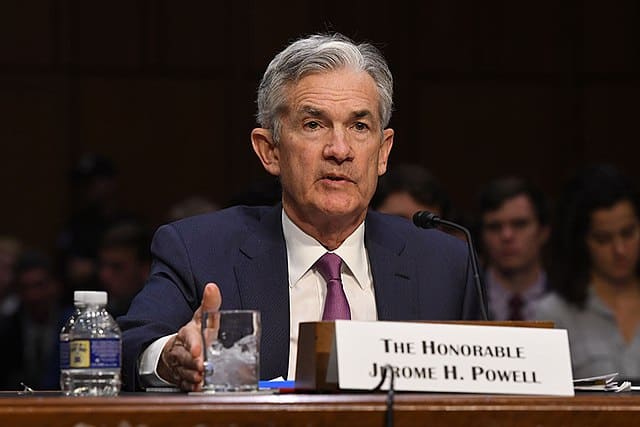 Powell Testimony 2018 by Federalreserve is licensed under Public Domain
Powell Testimony 2018 by Federalreserve is licensed under Public Domain
On August 25, 2022, The Hill published an op-ed by ATR Federal Affairs Manager Bryan Bashur. The piece discusses how the Federal Reserve has indicated through academic publications and statements that it intends to expand its regulatory authority over stablecoins, a considerable shift in government policy.
The article describes how employees at the Fed have written and proposed policy recommendations that include wiping out privately issued stablecoins, which are digital assets backed by the U.S. dollar or bonds, and replacing them with a central bank digital currency (CBDC).
One proposal, according to a paper co-authored by an attorney at the Fed, is to “introduce a central bank digital currency and tax private money out of existence.”
In one footnote, the paper comments that this recommendation is “essentially the route the Peoples Bank of China has taken with respect to cryptocurrencies.” China banned private cryptocurrencies so that its citizens would adopt the state-run central bank digital currency. The Fed is not opposed to pursuing the same heavy-handed policy that will crowd out private cryptocurrencies, limit options for consumers and consolidate control over Americans’ payment transactions with the central bank.
The piece goes on to explain that the establishment of a CBDC could provide the IRS with another tool to increase tax enforcement, especially because a CBDC could offer less anonymity than cash.
The op-ed next notes that the Fed also wants control over nonbank stablecoin issues, including discussing circumventing Congress to regulate nonbank issuers of stablecoins:
A report issued in 2021 explicitly encouraged the Financial Stability Oversight Council to use its authority under Dodd-Frank (a drastic expansion of the federal government in its own right) to designate certain stablecoin payment activities and capital requirements as “systemically important” without any input from Congress.
This egregious policy shifts power from elected representatives in Congress to unelected bureaucrats in the executive branch. Instead of being funded by congressional appropriations, the Fed is primarily funded from the interest it earns on the securities that it owns. This will make it difficult for Congress to shape future policies affecting stablecoins.
The piece continues by discussing how the Fed also wants to drag money market funds and nonbank stablecoin issuers under the same regulatory framework as banks, which would mean that only depository institutions would be able to issue stablecoins. The op-ed explains that this is based on the false premise that stablecoins are destined to cause financial distress, which is misleading. It also notes that Supreme Court precedent already precludes the Fed from regulating money market funds under the Bank Holding Company Act.
The article links to work done by the Cato Institute proposing a more transparent and less onerous framework and argues that consumers need transparency rather than regulatory impediments.
The op-ed proceeds by saying that the regulators ought to wait for Congress to act on the stablecoin issue, especially in light of the Supreme Court’s decision in West Virginia v. EPA:
The Supreme Court’s majority ruling in West Virginia v. EPA endorses the major questions doctrine and limits regulators’ authority to unilaterally pursue rules of great economic and political significance without congressional authorization. Considering that one in five Americans invest in, trade or use cryptocurrencies, and that there are likely numerous applications for digital assets that have yet to be discovered, Congress will need to act first.
The piece concludes by arguing that:
future consideration of policies should enable both banks and nonbanks to utilize the innovative technology unhindered by excessive government intervention. This can best be achieved by offering a clear legislative framework that continues to enable members of Congress to have a direct say in future regulation, instead of handing off the job to unelected bureaucrats with no accountability to the American people.
Click here to read the full op-ed.

